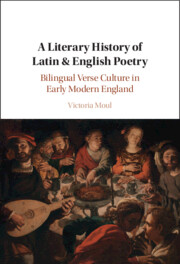Book contents
- A Literary History of Latin & English Poetry
- A Literary History of Latin & English Poetry
- Copyright page
- Dedication
- Contents
- Figures
- Acknowledgements
- Abbreviations
- Introduction
- Part I Shorter Verse
- Part II Longer Verse
- Chapter 9 Panegyric Epic in Early Modern England
- Chapter 10 Latin Style and Late Elizabethan Poetry
- Chapter 11 Palingenian Epic
- Afterword
- Metrical Appendix: Latin Metres
- Bibliography A: Manuscripts
- Bibliography B: Early Printed Books
- Bibliography C: Secondary Literature
- Index
Chapter 11 - Palingenian Epic
Allegory, Ambition and Didacticism
from Part II - Longer Verse
Published online by Cambridge University Press: 23 June 2022
- A Literary History of Latin & English Poetry
- A Literary History of Latin & English Poetry
- Copyright page
- Dedication
- Contents
- Figures
- Acknowledgements
- Abbreviations
- Introduction
- Part I Shorter Verse
- Part II Longer Verse
- Chapter 9 Panegyric Epic in Early Modern England
- Chapter 10 Latin Style and Late Elizabethan Poetry
- Chapter 11 Palingenian Epic
- Afterword
- Metrical Appendix: Latin Metres
- Bibliography A: Manuscripts
- Bibliography B: Early Printed Books
- Bibliography C: Secondary Literature
- Index
Summary
The tradition of unclassical scriptural paraphrase, such as that found in Du Bartas’ Sepmaines and Lucy Hutchinson’s Order and Disorder, has attracted some thoughtful critical attention in recent years. But Du Bartas’ work was modelled – albeit with elements of contention – on didactic epic of the type exemplified by Palingenius’ Zodiacus Vitae, an ubiquitous schooltext which was the very opposite of 'sub-canonical' in the seventeenth century. For the modern reader, approaching Milton's Paradise Lost via Virgil and Homer, the digressive mode of Du Bartas and the unclassical elements of Paradise Lost seem anomalous. Early modern poets and readers, however, were taught to approach the classics via approved Protestant or quasi-Protestant works composed by near contemporaries. Of these, the Zodiacus Vitae, though now largely forgotten and when remembered, almost universally misrepresented, was in England among one of the most influential. This chapter takes the achievement and allure of Palingenius’ poem seriously as a model in examining some of the very large number of examples of ‘unclassical epic’ read and composed by English authors in the sixteenth and seventeenth centuries.
Keywords
- Type
- Chapter
- Information
- A Literary History of Latin & English PoetryBilingual Verse Culture in Early Modern England, pp. 447 - 496Publisher: Cambridge University PressPrint publication year: 2022

